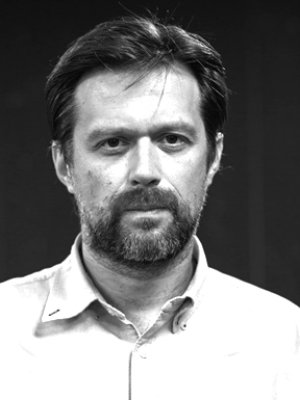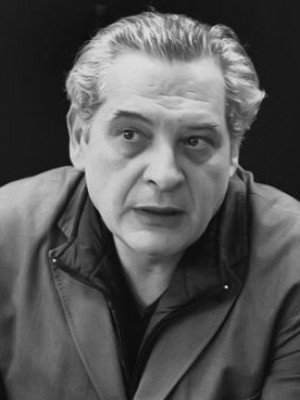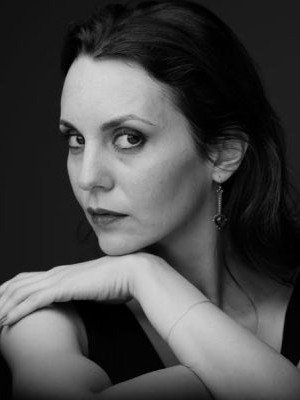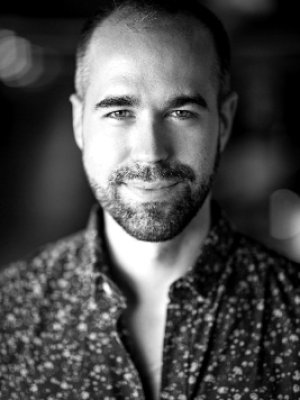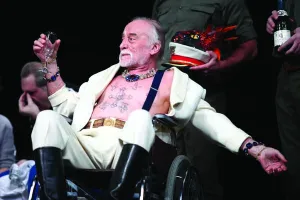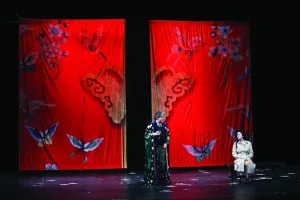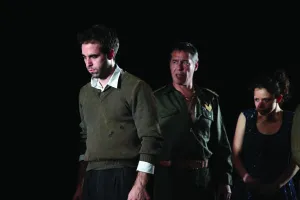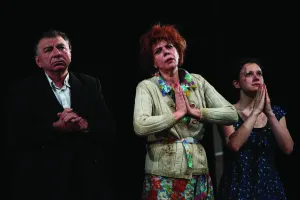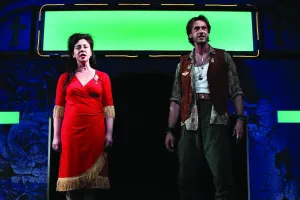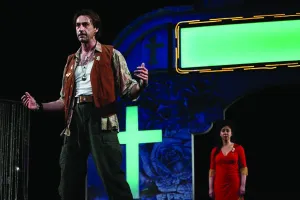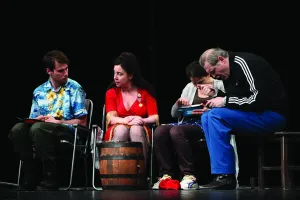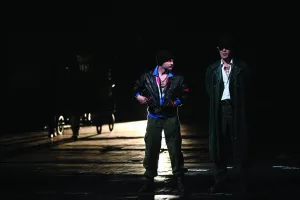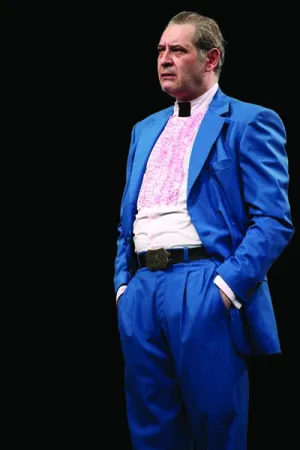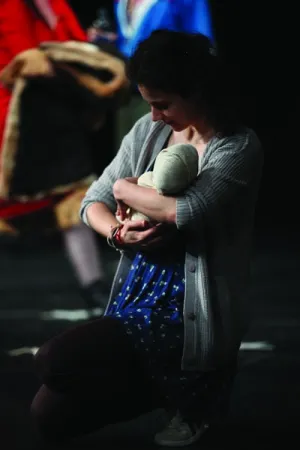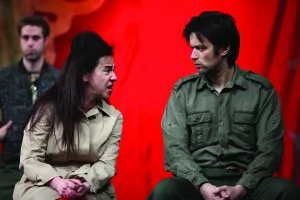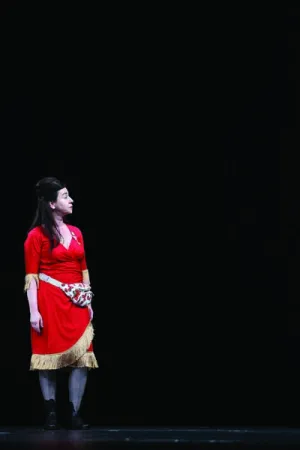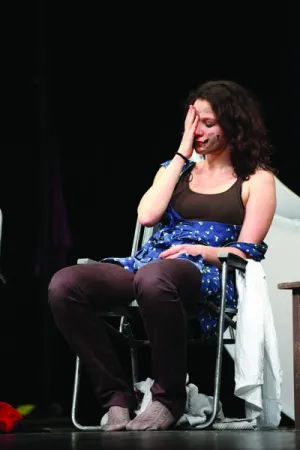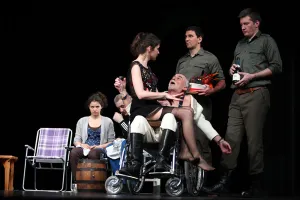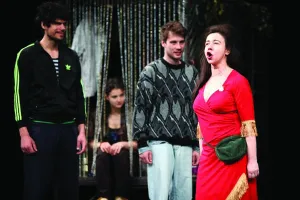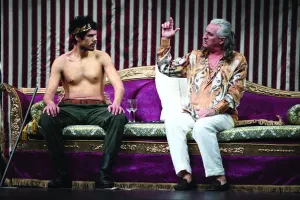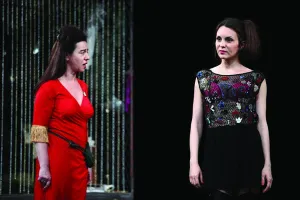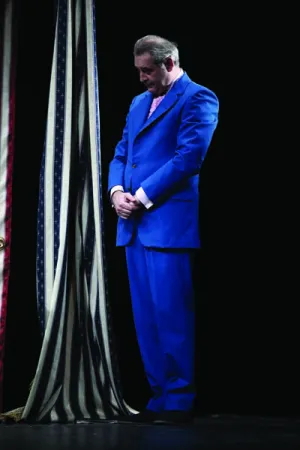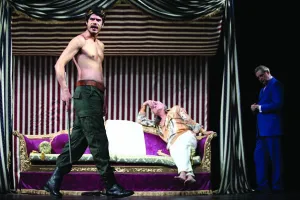Mother courage and her children
drama by Bertolt Brecht
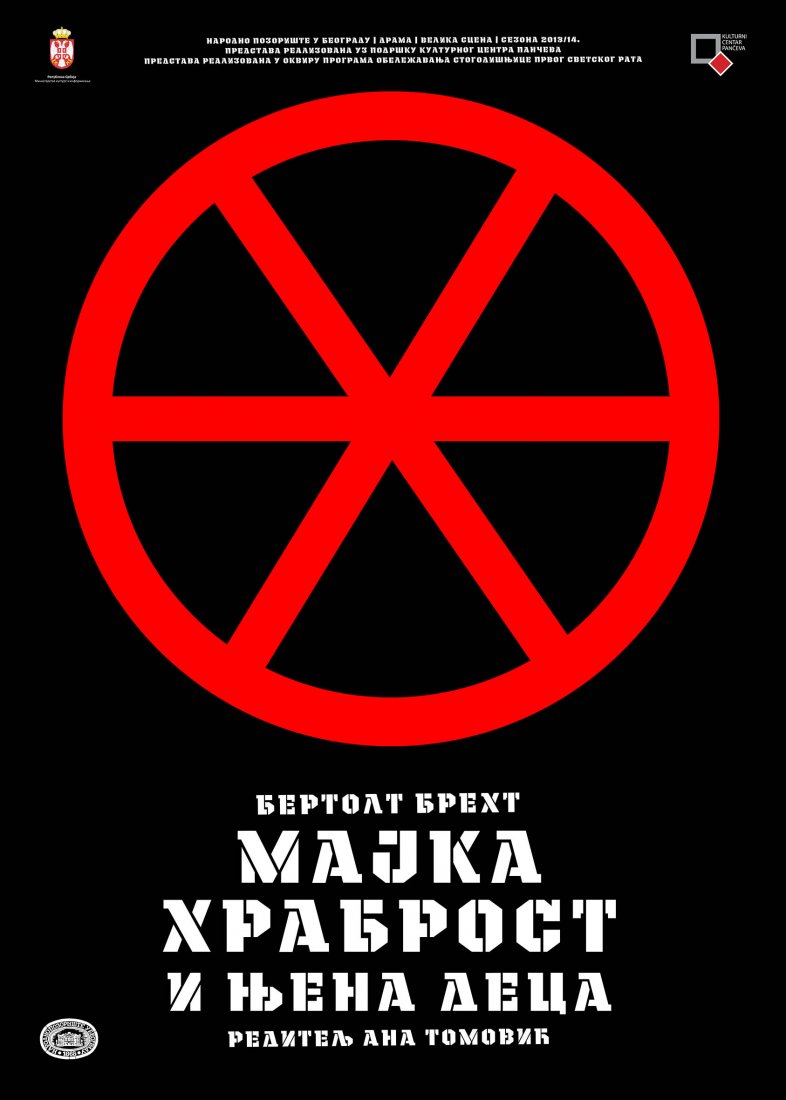
Three Questions about Bertolt Brecht
Post-Brechtian theatre?
Brecht used to call himself the Eisenstein of a new drama form. The self-estimation is not extreme if we understand his remarkable theory of epic theatre as an ultimately influential and operative invention. The theory gave an impulse to break up traditional dialogue on stage into a form of discourse or social-ogue. Brecht’s theory implicitly indicates that expression in theatre is made of equally valuable interaction of verbal and kinetic elements (gestus) and that it is not merely of literary nature. (Andrzej Wirth)
In light of newest (theatre) developments, it is becoming increasingly evident that in the theory of epic theatre there has been a revival and finalization of classical dramaturgy. Brecht’s theory contained an ultimately traditional thesis: for him, the fabula remains alpha and omega of theatre. (…) Post-dramatic theatre is Post-Brechtian theatre. It finds its place in the space opened by Brecht’s questions about presence and awareness of presentation process in what has been presented and his question about new “art of observation”. At the same time, it leaves behind the political style, tendency to dogmatise and emphasises the rational in Brecht’s theatre, it is placed in the time after authoritative rule of Brecht’s concept of theatre. The complexity of these relationships is evident in the fact that Heiner Müller took Robert Wilson as Brecht’s legitimate heir, “On the stage, the Kleist’s puppeteer theatre finds space for expression and Brecht’s epic dramaturgy finds space for dance.” (Hans-Thies Lehmann)
Mother Courage – Epicurean or ascetic?
At the premiere performance, Helene Weigel (B. Brecht’s wife and manager of the Berliner Theatre Company; Mother Courage and Her Children; 11 January 1949 – note by the author) was skinny and tiny, she seemed ascetic and a lot older than her age (she was 49 at the time). After her great success, everybody imitated her. Whereas, according to the text, Anna Fierling, nicknamed “Mother Courage”, was a wily canteen woman and, first of all, a woman who loves life, an Epicurean, not an ascetic. (…) Helene Weigel’s acting served as a model for designing of theory of alienation to Brecht. However, the alienation – Brecht’s V-Effekt – is not a dogma. When a West Germany actress, a friend of Brecht’s, found herself in a conflict with a young stage director by claiming that she is the only one who knows how to interpret Brecht, the director asked for the great playwright’s help. Brecht watched silently the rehearsal for half an hour and then shouted to the actress, “Either you’ll start interpreting the theatre, or I’ll come up there and kick you in the buttocks!” And when she asked what will happen to “fau-effekt”, Brecht answered, “We are not staging a fau-effect, we are staging my piece!” (Ivan Ivanji)
Meaning of current existence?
Andre Gide wrote that journalism in literature is everything that will be less interesting tomorrow than today. There is no “journalism in literature” in Brecht’s works, he creates an open work, he leaves open space for interpretation which is a lot wider than given in any single historic epoch or a single geographic area. And although his works are quite current, it is, it seems to me, because he possesses and he will always posses a certain current thrill, by opposing men and their history to everything which is the meaning of their current existence. (Horia Deleanu)
The writer had always experienced every of his poetic words as a social act, and he measured them against the meaning of their political effect. In his plays, Brecht had never understood his message as a platonic poetic symbol. Mother Courage was written just before the Second World War, at the time of Brecht’s political exile from Hitler’s Germany (1938), and it possesses intense political character. While psychosis of evil preparations for a new world slaughtering, when the malevolent hordes of fanatics, dressed in black, resurrected and renewed the cries and mottoes from the Thirty Years’ War, with criminal emotion and in the new version adapted to new circumstances, Brecht’s compassionate message, didactically modified, echoed with its tragic memento, but nobody wanted to listen. Amidst uncivil chorus of military incantations and invitations to kill, his voice, the voice of consciousness and common sense, echoed with clear metallic sound of pacifism. (Eli Finci)
P.S.
Truly, I live at dark times!
The guileless word is folly. A smooth forehead
Suggests insensitivity. The man who laughs
Has simply not yet had
The terrible news.
(B. B.)
Prepared by Željko Hubač
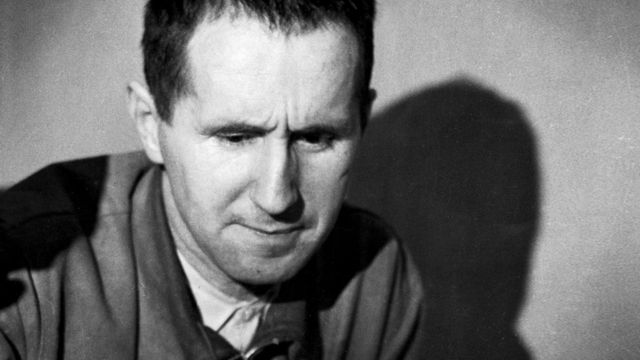 BERTOLT BRECHT
BERTOLT BRECHT
Brecht was born in Augsburg in 1898, as a son of a managing director in a paper mill. The army drafted him when the First World War was near its end. Brecht studied medicine in Munich, but he never finished. His first play, Baal, was published in 1920. He was awarded the prestigious Kleist Prize for Drums in the Night. In 1924, Brecht moved to Berlin, where he worked as a dramaturge with Max Reinhardt’s and Erwin Piscator’s theatre companies. With The Three-Penny Opera (also known as The Beggar’s Opera), music by Kurt Weill, Brecht achieved international success (1928). In 1933, Hitler took power and Brecht left the country to live in Austria, Switzerland, France, Denmark, then in Sweden and Finland, and finally in the USA, where he wrote some of his well-known plays by the end of the war (The Resistible Rise of Arturo Ui, Life of Galileo, Mother Courage and Her Children). He returned to Europe in 1948, and settled in East Berlin, where he and his wife, actress Helene Weigel, established and ran the famous Berliner Ensemble. He died in Berlin in 1956. Bertolt Brecht wrote over forty plays. With his dramatic opus, as well as his theoretic and stage directing works, he created a new approach to modern theatre. In addition, Brecht was a poet, a storyteller and a novelist, one of the most important authors of German and world literature.
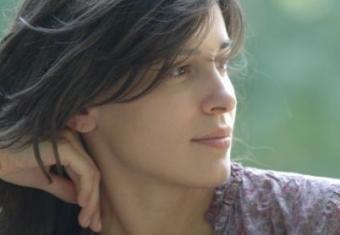 ANA TOMOVIĆ
ANA TOMOVIĆ
Ana Tomović was born in 1979. She graduated from the Department of Theatre and Radio Directing at the Faculty of Dramatic Arts in Belgrade, in the class of Professor Egon Savin. Currently, she is at the doctoral studies at the same Faculty. She directed the following productions: Crime and Punishment (F. M. Dostoyevsky, Yugoslav Drama Theatre), The Finger (Doruntina Basha, Heartefact/Bitef Theatre), The Witches (Roald Dahl, Little Theatre “Duško Radović”), Romeo and Juliet (Shakespeare, Theater Oberhausen), Ronald, Please Understand Me (Filip Vujošević, National Theatre in Belgrade), Case Woyzeck – Hinkemann (G. Buchner/Ernst Toller, Bitef Theatre), Boat for Dolls (Milena Marković, Serbian National Theatre), Trtmrtživotilismrt (Ana Tomović, Belef 2007), Norway.Today (Igor Bauersima, joint production of BDP and Kruševac Theatre), Monogamy by Stella Feehily (Sombor National Theatre), The Return of Casanova (Arthur Schnitzler, Serbian National Theatre), Halflife (Filip Vujošević, Atelje 212), The Duck (Stella Feehily, Kraljevo Theatre), Creeps (Lutz Hubner, Belgrade Drama Theatre). She was an assistant director at the production Fast sicher (Theater am Neumarkt, Zurich, 2007). Goethe Institute awarded her a scholarship for an academic sojourn in Thalia Theater (Hamburg, 2008). Ana won two “Joakim Vujić” Awards for directing and her production Boat for Dolls won in the 54th Sterijino Pozorje Festival in 2009. She has participated in numerous national and international festivals (BITEF 2009, "Neue Stuecke aus Europa", Wiesbaden 2010, "European Young Directors Forum", La Mama Theatre New York 2012...) She was an editor in the BITEF Bulletin, 1998-2005, and a member of the editorial board of the FEST Bulletin, 1999-2000. She established and ran the “In Stage” Organisation, where she worked with groups of marginalised children and young people by using drama techniques. In the Cultural Centre “Stari Grad”, she held drama workshops, “Growing-up Theatre”, for children and the young and staged Romeo and Juliet – There Is No Difference and Wow, School is Great.
Premiere performance
Premiere, june 1, 2014 / Main stage
Translation by Olivera Milenković
Director Ana Tomović
Dramaturges Vuk Ršumović, Željko Hubač
Conceptual Design of the Set LJerka Hribar
Costume Designer Momirka Bailović
Composer Irena Popović Dragović
Stage Movement Tamara Antonijević
Stage Speech Ljiljana Mrkić Popović
Premiere Cast:
Mother Courage Dušanka Stojanović Glid
Catherine Jelena Trkulja
Eilif Milutin Milošević
Swiss Cheese Mladen Sovilj
Recruiting Officer, Man with the Bandage on his Eye NIkola Vujović
Sergeant, Second Sergeant Darko Tomović
Young Soldier, Lieutenant Hadži Nenad Maričić
Cook Slobodan Beštić
General, Older Soldier Gojko Baletić
Chaplain Nebojša Kundačina
Ordnance Officer, Peasant Milenko Pavlov
Yvette Pottier Nada Šargin
Soldier, Clerk, Regimental Secretary Dragan Nikolić
Peasant’s Wife Suzana Petričević
Old Colonel Tanasije Uzunović
Soldier, Peasant’s Son Pavle Jerinić
Musicians: Nikola Dragović, violin; Tanja Ščerbak, piano; Vladimir Gurbaj, clarinet; Danilo Tirnanić, percussions
Extras: Miloš Dmitrović, Milan Šavija
Assistant Director, Organiser Jasmina Urošević
Prompter Jelena Žikić
Stage Manager Miloš Obrenović
Assistant Set Designer Miraš Vuksanović and Jasna Saramandić
Light Operator Miodrag Milivojević
Make-Up Dragoljub Jeremić
Set Crew Chief Zoran Mirić
Sound Operator Roko Mimica
SETS AND COSTUMES WERE MANUFACTURED IN THE NATIONAL THEATRE WORKSHOPS

